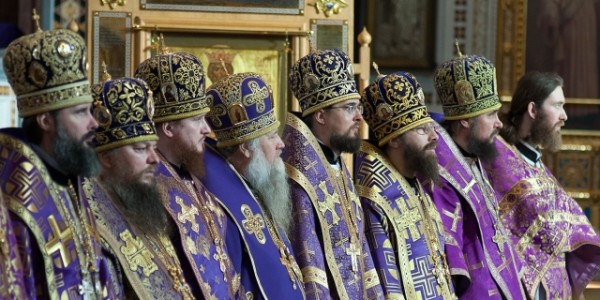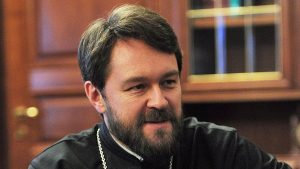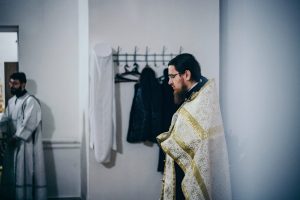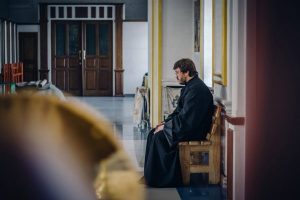Obviously, a particular person’s experience of their bishop will vary. If you were a member of a cathedral parish, you probably would get to know the bishop very well, even as a layman. But given the numbers of Orthodox Christians in the United States, there are going to be large areas of the country that are not close to such cathedrals. Fortunately, in the case of our parish, even though our bishop’s cathedral is just a bit more than a thousand miles away from our parish, we have seen him visit our parish at least once each year, and he comes to our area a few more times a year on average… and so we do get a chance to hear him preach, and for him to visit with people after the services. There are dioceses in which parishes almost never see their bishops, unfortunately.
Our experience of a bishop will not only differ based on geography, but bishops have different personalities, different energy levels, and they also differ in terms of their levels of piety. If you had a bishop like St. John (Maximovitch), your experience of your bishop would be very different from those who have had some of the bishops that we have seen involved in personal scandals. But even among the twelve apostles, one of them was Judas. We should thus not be surprised to see that our bishops are human, and some of them fail in their ministry.
Regardless of how often we see our bishop, how pious he may be, or how much of a personal relationship we may or may not have with him, we owe our bishops our prayers and our obedience:
“Remember them which have the rule over you, who have spoken unto you the word of God: whose faith follow, considering the end of their conduct…. Obey them that have the rule over you, and submit yourselves: for they watch for your souls, as they that must give account, that they may do it with joy, and not with grief: for that is unprofitable for you” (Hebrews 13:7,17).
St. Paul also says of himself, “Be ye followers of me, even as I also am of Christ” (1 Corinthians 11:1). We should imitate our leaders, as they follow Christ. If we see something in them that is not in accordance with Christ, we should not imitate them in that. But even if we find that they fall far short of being the kind of Christian that they should be, we still must pray for them, and obey them, unless they ask us to do something that is evil. If we have a good bishop, we should thank God. If we have a bishop who is not so good, we should pray that God would make him better.
The canons of the Church tell us that we cannot separate from our bishop simply because we see him sin, or violate the canons and traditions of the Church. We can and should make the synod that he answers to aware of his behavior, if his errors are serious enough to warrant it, but we have to allow the synod of bishops to deal with their brother bishop, in accordance with the canons. Only when a bishop preaches heresy, clearly, unambiguously, and publicly do we have grounds to separate from them. Thankfully, in most cases, our bishops are sincere and pious men, and while they are not perfect, they are not malicious. We may not always agree with their decisions, or understand the reasoning behind them, but we have to follow their instructions (except in those rare instances in which a bishop would require someone to do something that would be in clear violation of the teachings of the Church). We also have to keep in mind that bishops make decisions based on the information that they have, which we may not be privy to. We have to give them the benefit of the doubt, and assume they are acting in good faith, unless proven otherwise. We can also communicate to them our concerns, in a respectful manner, because we may have information that they are not privy to as well.
St. Ignatius of Antioch, a disciple of the Apostle John wrote: “Flee from divisions, as the beginning of evils. You must all follow the bishop, as Jesus Christ followed the Father, and follow the presbyters as you would the apostles; and respect the deacons as the commandment of God. Let no one do anything that has to do with the Church without the bishop. Only that Eucharist which is under the authority of the bishop (or whomever he himself designates) is to be considered valid. Wherever the bishop appears, there let the congregation be; just as wherever Jesus Christ is, there is the Catholic Church. It is not permissible either to baptize or to hold a love feast without the bishop. But whatever he approves is also pleasing to God, in order that everything you may do may be trustworthy and valid” (Smyrneans 8:1-2).
Because the Bishop cannot be in every parish in a given diocese, we have priests and deacons, who are the extension of the bishop’s ministry. One of the biggest responsibilities of a bishop is to be a pastor to the pastors of his diocese. By guiding his priests and deacons, the bishop is able, through them, to guide the people in his diocese, when he is not there to do so directly, in person.
It should also be pointed out that the people also have a role in guiding the diocese, and assisting the bishop. They do this by their work in their local parish, by their attendance at general parish meetings; and they also do this through their representatives on the parish council, and through their delegates to diocesan assemblies, All-Diaspora Councils, and at All-Russian Councils. In this way, the people ensure that the finances, and organizations of their parish, and their diocese are managed in a transparent and appropriate manner. We tend to get the leadership we deserve, and so if things are not being run well, we probably need to roll up our own sleeves and get to work at helping to fix those problems — and the more we do that, the better we will see things being run.




















